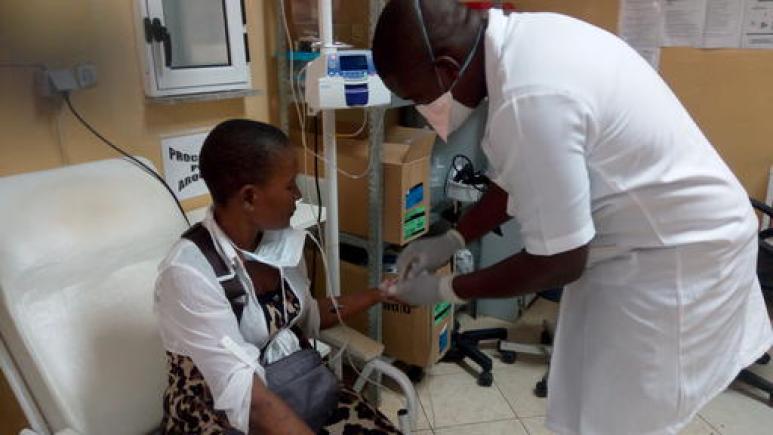Towards a better and more effective treatment of AIDS-associated Kaposi sarcoma in Mozambique
Kaposi's sarcoma develops following an infection with a virus called human herpes virus 8 (HHV-8). People infected with human immunodeficiency virus (HIV) — the virus that causes AIDS — have the highest risk of Kaposi's sarcoma, because the immune system damage caused by HIV allows cells harboring HHV-8 to multiply.
Kaposi's sarcoma: a common cancer in HIV-infected patients
The AIDS epidemic has caused an explosion in the number of cases of Kaposi's sarcoma, particularly in those parts of Africa where HHV-8 is endemic. It is thus the most common cancer in Central and South Africa. Kaposi's Sarcoma usually manifests itself as skin lesions that appear as painless purplish spots on the legs, feet, or face.
An avenue for effective and better tolerated treatment
Between 2010 and 2015, 1567 HIV-positive patients were treated for Kaposi’s sarcoma at the Centro de Referencia de Alto-Maé (CRAM), a specialized outpatient center in Maputo, a collaboration between MSF and the Mozambican Ministry of Health.
The treatment of HIV-associated Kaposi's Sarcoma is antiretroviral therapy (ART), a combination of drugs given to treat HIV. In advanced forms, chemotherapy may be needed. The standard regimen in Mozambique includes conventional doxorubicin, bleomycin and vincristine. « But these combinations can be poorly tolerated and with lower quality of life, » says Rebeccas Grais, Research Director at Epicentre. Drugs used in high-income countries, called Pegylated liposomal formulations of doxorubicin (PLD), have better outcomes and fewer side effects. In March 2016, Médecins Sans Frontières therefore decided offer PLDs as first line therapy for KS in Maputo, Mozambique. To document safety, effectiveness and tolerability of PLDs, a prospective, single-arm, open-label observational study has been launched. A reduction or even disappearance of the tumor was observed in 80% of patients.
"The follow-up of 116 patients who received PLD in Mozambique shows that this treatment is well tolerated and effective as a first-line treatment for Kaposi's Sarcoma,” says Matthew E. Coldiron, coordinator of the trial and 1st author of the article on the results of the study published in Infectious Agents and Cancer.
Facilitating access to PDL treatment
In addition to being effective, PDL improved the quality of life of patients, primarily through pain reduction, something that had not been evaluated previously in Mozambique.
The issue now is the accessibility to PLD, which, due to its cost and production remains limited in many countries in Africa. A first step has been taken as PLD now appears on procurement lists of the Global Fund to Fight AIDS, TB and Malaria. The other area of improvement is the diagnosis of Kaposi's sarcoma in AIDS patients. To date, in Mozambique and other African countries, patients are often treated in the advanced stages of the disease. Earlier diagnosis would facilitate treatment and thus the quality of life of patients.
Testimony of Luísa Enoque Comiche, 37 years old
“I discovered that I had HIV in October 2016. I started ART and in March 2017 I was diagnosed with Kaposi's sarcoma. I had a few spots, and I was feeling very strong pain. I was hospitalized at the Maputo Central Hospital for some time until in June I was transferred to the Alto Maé Reference Center to continue with Kaposi's treatment doing chemotherapy. Actually my first chemotherapy was in HCM, but did not work very well. When I started treatment here in Alto Maé things started to change for the better.
The first chemotherapy session was not easy, but then I got used to it. Now I feel very well. The treatment I am doing here is reacting well in my body. Before it was very bad, my feet were swollen, I did not wear pants or shoes. I could not walk but now I'm fine, I am back to my normal life. I have been undergoing treatment for seven months, and I have only two chemotherapy sessions to complete the Kaposi treatment.
I would like to call on the health authorities to expand this treatment that we are having here in Alto Maé to other health facilities. There are many people who have this disease but unfortunately they are not having this opportunity.”







